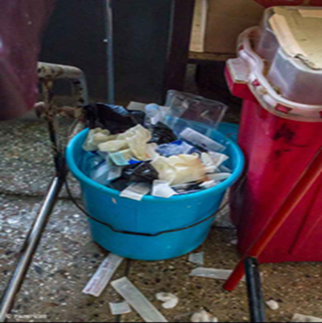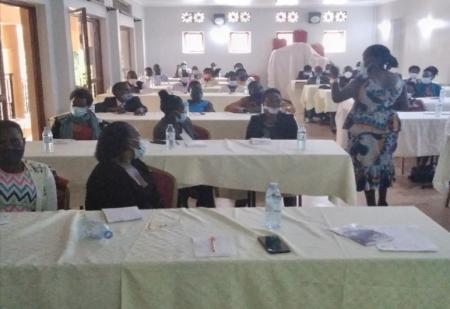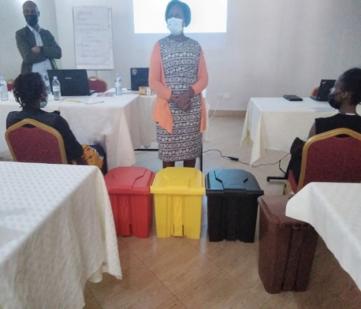Health workers including doctors, nurses, patient care givers and cleaners are exposed to hospital acquired infections. Due to the nature of their job, cleaners face the highest risk yet are least equipped with protective materials and knowledge on Infection Prevention and Control (IPC) in health care facilities.
Published on: 06/12/2021
Despite the commitment by various institutions to achieve health and hygiene targets in Sustainable Development Goals 3 and 6 by 2030, hospital acquired infections have remained high over the past years, with 5–15% of people acquiring infections from health facilities globally. The rate of infection spiked during the COVID-19 pandemic mainly because Infection Prevention and Control (IPC) measures in some health care facilities (HCFs) remain inadequate.

A pile of poorly handled waste showing what cleaners are exposed to while in the line of duty
Recruited as support staff with a minimum expectation to provide menial labour, some cleaners in the process of doing their job unknowingly worsen the environmental hygiene in and around the health care facility, through poor management of hospital waste and dispersion of micro-organisms over larger surface areas.
Water Sanitation and Hygiene (WASH) and IPC promotion in Uganda and Kabarole particularly is not a new thing. Some institutions and health care facilities have previously undertaken initiatives to mitigate hospital infections through providing protective gear and appropriate waste disposal equipment, formation of IPC committees and inclusion of some cleaners on the IPC committee, as stipulated in the Ministry of Health (MoH) guidelines (2019). The MoH (2019) guidelines on WASH in HCFs further provides that structured training on IPC should be organised for all new staff of any health care facility and on a recurring basis. However, cleaning staff in health care facilities are often left out whenever there is an opportunity for such trainings.
Empowering cleaners with sufficient skills on HCF waste management and IPC would enable them to remove more than 90% of micro-organisms through thorough cleaning. To bridge this gap, IRC in October 2021 partnered with Kabarole District Local Government to train cleaners in all the HCFs, empowering them to improve their safety while at work as well as to minimise the spread of infections for health care workers and clients. Training of cleaners was the first of its kind in Kabarole district and it provided a forum for the cleaners to share their experiences, learn from one another as well as attain the much-needed skills in safe WASH and IPC.
The IPC mentors of Kabarole district facilitated the training with reference to the Uganda National IPC guidelines 2013 (MoH) and the TEACH CLEAN (Training in Environmental Hygiene and Cleaning in Health care) package promoted by USA Centers for Disease Control and Prevention (CDC) and obtainable from the Ministry of Health Uganda Infection Prevention and Control Archives.
Some of the key components covered at the training include:
During the sessions, didactic and hands-on practical approach with case scenarios and demonstrations were employed to equip participants with all the relevant IPC/WASH skills. Some cleaners shared that due to lack of any form of training and consideration of their opinions, they had previously thought of abandoning their work in HCFs. This training was therefore highly appreciated by cleaners since it enabled them to appreciate their roles in WASH and IPC, restored their dignity and rejuvenated their ability to love their work and offer it as a service.


Ms. Catherine (An IPC mentor) training cleaners on IPC (left) A participant demonstrating waste segregation using coloured bins (right)
"I felt very honoured for having been considered for this training! I had never thought that any organisation could look out for us cleaners. This made me realise that we are also very important, and this made me love my job." [Cleaner, Male, Ruteete HC III]
"I got an opportunity to meet and train the cleaners on their roles towards improving WASH/IPC, I never saw any of them dose, yawn or loose interest. Their reactions would tell how glad and appreciative they were for having received the training." [IPC mentor, DHE, Catherine Kemigabo]
The training also empowered the cleaners with knowledge and skills on how to minimise the burden associated with hospital acquired infections, the cleaning protocols in a health care setting, the use of personal protective equipment and waste management and segregation.
Apart from increasing their awareness, since it is imperative that the hospital management and relevant authorities provide the cleaners with a conducive working environment and necessary equipment, the participants developed action plans and presented proposals to the District Health Department to address challenges that affect their work. The training provided an open platform for cleaners to directly interface with the facility in-charges and the District Health Department. The outcome was an outlined plan of action against each challenge presented, aligned to the responsible office. Challenges included inadequate protective equipment and cleaning materials, limited budget allocation to waste management and disposal, unreliable water supply for cleaning, and importantly that the cleaners did not have a platform to air their views and were excluded from training on IPC.
This plan of action will be the point of reference for monitoring, evaluation and accountability. It is apparent that cleaners need more intentional empowerment and capacity building to help them appreciate that their job contributes significantly not only to minimising hospital acquired infections but also to the realisation of Sustainable Development Goal 6.